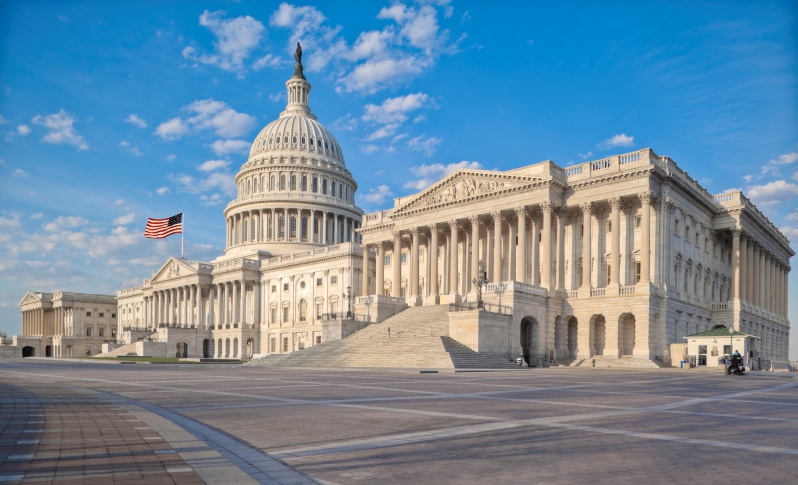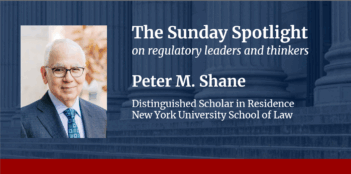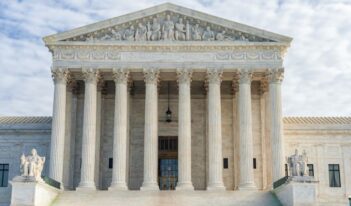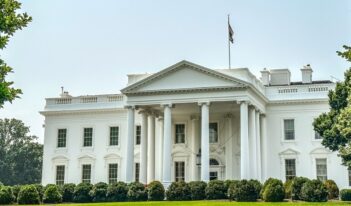
The filibuster has caused Congress to give up its constitutional power to oversee the administrative state.
Fearing minority rule, the Framers of the U.S. Constitution considered and rejected a supermajority requirement for the U.S. Senate. But the filibuster rule that prevails today—a Senate procedural requirement calling for 60 votes to end debate and move forward with most legislation—has effectively created such a requirement for most legislation. The filibuster is inherently undemocratic, and many Americans today support filibuster reform or repeal.
In addition to its undemocratic character, the filibuster also disrupts the U.S. Congress’s ability to direct administrative agencies, ceding power to the President and the courts to wield disproportionate power over the administrative state.
As the unofficial “fourth branch” of government, federal agencies exercise legislative and executive power over the public. Theorists generally agree that the administrative state has at least two principals—Congress and the President—that oversee agencies.
Article I of the U.S. Constitution vests all legislative power in Congress. But Congress can delegate some legislative power to agencies through authorizing statutes. This delegation of legislative power allows administrative agencies to create rules that bind the public. This rulemaking power is vast—agencies adopt thousands of regulations every year, touching virtually every aspect of American life.
But the Constitution also grants the executive branch some power over these administrative agencies. The President has the authority to appoint and remove the heads of agencies. Although their power to do so is debated, Presidents behave as if this appointment and removal power allows them to direct administrative agencies. Through memos, public addresses, and other actions, Presidents place pressure on agency officials to adopt their preferred course of action.
Although Presidents exert influence over agencies, Congress is the legitimate source of agency authority. In recent decades, however, the rise of the use of the filibuster has made it harder for Congress to wield its power over the administrative state. Because it is rare for 60 senators to back any one bill, Congress rarely passes legislation, even when the same party controls both houses of Congress and the presidency.
Senators have used the filibuster to block popular policies from becoming law, from prohibitions on poll taxes and housing discrimination to equal pay. Recently, a minority of senators blocked the For the People Act, a bill to undo state-imposed voting restrictions.
More significantly, many bills are never considered, or even written, because senators recognize that their proposals would not overcome the filibuster rule. During the Obama Administration, major climate change legislation passed the U.S. House of Representatives but was never brought to a vote in the Senate. In 2009, Senate Democrats removed a public option from the Affordable Care Act when it became clear that the bill would not overcome a filibuster if such a government-run health care plan was included. And a 2019 bipartisan bill to expand background checks for gun purchases has not been brought for a vote in the Senate because the proposal does not have the support of 60 senators.
To circumvent this congressional gridlock, President Joseph R. Biden has issued executive actions covering voting rights, climate change, gun violence, and more. These sweeping executive actions instruct the heads of agencies to find ways to expand voter participation, order the heads of agencies to review Trump-era climate regulations and policies, and direct the U.S. Department of Justice to propose a new rule on ghost guns, among other requests.
President Biden is not the first President in recent years to rely on the administrative state to bypass Congress. In 2010, senators used the filibuster to defeat a bill that would have provided protections to Dreamers—undocumented individuals who were brought to the United States as children. In response, the Obama Administration established the Deferred Action on Childhood Arrivals program through an executive branch memo. President Barack Obama famously commented, “I’ve got a pen to take executive actions where Congress won’t.”
President Obama issued 276 total executive orders over eight years in office, prompting criticism from Republicans. Yet President Donald J. Trump outpaced his predecessor, issuing 220 executive orders in four years. President Biden has issued 66 executive orders so far.
As these numbers reflect, federal policymaking in the United States is increasingly accomplished by presidents unilaterally directing the administrative state without formal input from Congress.
Administrative agencies hold extraordinary power over the American people. In a democracy, the principal body responsible for granting agencies power to bind the public should represent the interests of the majority, not a small minority. But a minority of senators, at times representing a minority of the population, can block Congress from empowering or directing administrative agencies. Currently, 42 Republican senators from low-population states represent less than 30 percent of the U.S. population.
The Senate’s difficulty in passing legislation also transfers power to the courts. When parties claim that an agency has acted outside of the bounds of what Congress authorized it to do, a court will determine if the authorizing statute allows the action.
In theory, if a court misinterprets Congress’s intent, Congress can overturn the ruling of the court and clarify its direction to the agency through subsequent legislation. Constitutionally, such a legislative check on the judiciary should only require a majority of Congress. The filibuster effectively prevents Congress from correcting courts, increasing the power of the judiciary to impose its own will on agencies.
Many commentators criticize the filibuster as an undemocratic process that lacks a constitutional basis. But the filibuster also disrupts the balance of power in the federal government. It transfers power from Congress—the legitimate source of agencies’ legislative power—to the President and the courts.
If the Senate is to exercise its constitutional power to delegate rulemaking authority to administrative agencies, especially in a way that meaningfully represents the American people, senators must take seriously the growing calls from around the country to end the filibuster.



